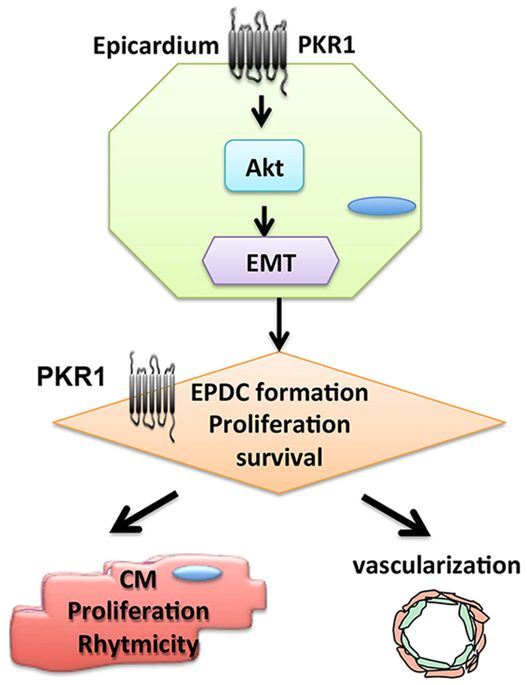Introduction of PROKR1
PROKR1 is encoded by the PROKR1 gene. It belongs to the G-protein-coupled receptor (GPCR) family which is the largest known class of molecular targets with proven therapeutic value. It is one of the two subtypes of family A GPCRs (PROKR1 and PROKR2). Amino acids sequence indicates that PROKR1 and PROKR2 share 85% sequence identity. PROKR1 has seven membrane-spanning α-helical segments separated by alternating intracellular and extracellular loop regions as other GPCRs. Meanwhile, PROKR1 contains a nine-residue insert in the second intracellular loop and in the C terminal tail.
| Basic Information of PROKR1 | |
| Protein Name | Prokineticin receptor 1 |
| Gene Name | PROKR1 |
| Aliases | G-protein coupled receptor 73, G-protein coupled receptor ZAQ, GPR73a, PKR1 |
| Organism | Homo sapiens (Human) |
| UniProt ID | Q8TCW9 |
| Transmembrane Times | 7 |
| Length (aa) | 393 |
| Sequence |
METTMGFMDDNATNTSTSFLSVLNPHGAHATSFPFNFSYSDYDMPLDEDEDVT NSRTFFAAKIVIGMALVGIMLVCGIGNFIFIAALVRYKKLRNLTNLLIANLAI SDFLVAIVCCPFEMDYYVVRQLSWEHGHVLCTSVNYLRTVSLYVSTNALLAIA IDRYLAIVHPLRPRMKCQTATGLIALVWTVSILIAIPSAYFTTETVLVIVKSQ EKIFCGQIWPVDQQLYYKSYFLFIFGIEFVGPVVTMTLCYARISRELWFKAVP GFQTEQIRKRLRCRRKTVLVLMCILTAYVLCWAPFYGFTIVRDFFPTVFVKEK HYLTAFYIVECIAMSNSMINTLCFVTVKNDTVKYFKKIMLLHWKASYNGGKSS ADLDLKTIGMPATEEVDCIRLK |
Function of PROKR1 Membrane Protein
The activity of PROKR1 is activated by its ligands, prokineticins 1 and 2 (PK1 and PK2), which belong to the AVIT protein family. PROKR1 and prokineticins signaling system is involved in various physiological conditions, including heart failure, circadian rhythm disturbances, inflammation, polycystic ovary syndrome, neuroblastoma, Kallman syndrome, and cancer. Developing inhibitors against PKRs may serve as a potential therapeutic strategy for various pathologies. PROKR1 and its ligands may regulate to cardiovascular diseases because PROKR1 and its ligands have high expression levels in cardiovascular tissues and cells. The interaction between PROKR1 and Gα11 activates both mitogen-activated protein kinase and Akt signalling pathways, resulting in stimulating the proliferation, migration, and angiogenesis of capillary endothelial cells derived from heart. The PROKR1-null mice display morphological abnormalities in both hearts and kidneys, which suggests that the possible role of PROKR1 in cardiorenal syndrome. At the same time, the over-expression of PROKR1 in cardiomyocyte isolated from heart prevents cell apoptosis induced by oxidative stress and Akt signaling pathway.
 Fig.1 PROKR1 signaling via Akt activation to regulates EMT process. (Arora, 2016)
Fig.1 PROKR1 signaling via Akt activation to regulates EMT process. (Arora, 2016)
Application of PROKR1 Membrane Protein in Literature
This article investigates the role of prokineticin-2 and its receptor PROKR1 in the epicardium of developing and adult heart. The Genetic knockout of PROKR1 in mice epicardium results in abnormal heart development, which reveals that the PROKR1 regulates the reciprocal interaction between epicardium and cardiomyocyte.
This article reviews the biological activities of prokineticins (PK1 and PK2) and their two common G-protein-coupled receptor (PKR) 1 and 2 and PK2/PKR1 signaling pathway plays an important role in postnatal cardiac and renal neovascularization.
Authors in this group apply ligand-based pharmacophore models and DrugBank dataset to identify novel potential binders of human PROKR1, which will help in advancing the understanding of the mechanism of PROKR1 signaling pathway.
This article demonstrates the PROKR1 and autocrine/paracrine pathways contribute to the cardio-obesity by controlling the CFP-adipocyte-transformation in adult heart. The development inhibitors against PROKR1 may open a new treatment for metabolic cardiac diseases and atherosclerosis.
This article reports the PK2/PKR1 signaling is involved in the development of inflammation-related testicular diseases because PKR1 is upregulated in orchitis significantly in lipopolysaccharide-induced testitis rat model.
PROKR1 Preparation Options
To obtain the soluble and functional target protein, the versatile Magic™ membrane protein production platform in Creative Biolabs enables many flexible options, from which you can always find a better match for your particular project. Aided by our versatile Magic™ anti-membrane protein antibody discovery platform, we also provide customized anti-PROKR1 antibody development services.
Creative Biolabs is one of the world’s leading biotechnology companies in the field of membrane protein. Creative Biolabs is a customer-based company, deeply rooted in science and innovation to provide new custom service to our worldwide customers. Please feel free to contact us for more information.
Reference
All listed services and products are For Research Use Only. Do Not use in any diagnostic or therapeutic applications.